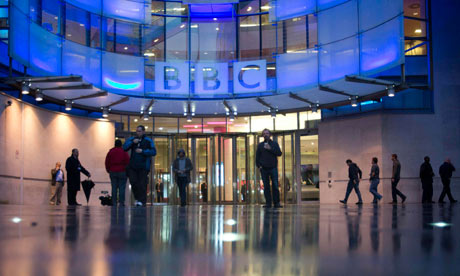
The BBC has admitted that it has wasted almost £100m on a technology project that was designed to make the corporation "tapeless", and has closed it to stop it "throwing good money after bad".
The BBC has spent £98.4m on the controversial Digital Media Initiative – which was designed to do away with video tapes and create a kind of internal YouTube of BBC archive content that staff can access, upload, edit and then air from their computers – the equivalent of almost 660,000 licence fees.
BBC trustee Anthony Fry has written to the Margaret Hodge, chairman of the Public Accounts Committee, and to the National Audit Office explaining that the BBC's chief technology officer, John Linwood, has been suspended from his £287,000-a-year job.
Fry has also invited the PAC to hold a hearing on the issue.
He said in his letter to Hodge, which has been seen by the Guardian, that to spend any more money on DMI would "be, I fear, equivalent to throwing good money after bad."
"DMI will have cost the BBC £98.4m, having generated little or no assets," he said. "It is of utmost concern to us that a project which had already failed to deliver value for money in its early stages has now spent so much more of licence fee payers' money.
"The trust is extremely concerned by the way the project has been managed and reported to us and we intend to act quickly ensure that there can be no repeat of a failure on this scale."
The BBC Trust has appointed PricewaterhouseCoopers to conduct an investigation to establish what went wrong in terms of project management, control and governance.
BBC director general Tony Hall has taken the decision to close DMI.
"The DMI project has wasted a huge amount of licence fee payers' money and I saw no reason to allow that to continue which is why I have closed it," he said. "I have serious concerns about how we managed this project and the review that has been set up is designed to find out what went wrong and what lessons can be learned. Ambitious technology projects like this always carry a risk of failure, it does not mean we should not attempt them but we have a responsibility to keep them under much greater control than we did here."
DMI has had a chequered history. After it was approved by the BBC Trust in 2008, technology supplier Siemens was given a £79m contract without open competition.
But Siemens failed to deliver and the contract was terminated in 2009 by mutual agreement.
DMI was then taken in-house but the BBC had incurred a two-year delay and lost £26m in projected cost-saving benefits as a result.
Problems with the system were first exposed during the coverage of the death of Baroness Thatcher earlier this year – when BBC News staff were unable to access archive footage of the late prime minister via computers in New Broadcasting House in central London were forced to ferry tapes from the corporation's archive storage facility in Perivale, north-west London, in taxis or on the tube.
DMI was supposed to deliver £95.4m of savings to the corporation due to the efficiency of the new technology and the fact it was supposed to make using archive material for programmes quicker and cheaper.
After the issue was raised by the Guardian, Rob Wilson, MP for Reading East, wrote to Hall on 2 May, "serious concerns over the project's effectiveness".
Wilson asked "how much in total the BBC has spent on the Digital Media Initiative" and "how much of the benefits the project was supposed to deliver (estimated at £95.4m) have so far been delivered?"
Having not received a response, he wrote again earlier this week.
Meanwhile, BBC News head of technology Peter Coles is standing in while Linwood is suspended, pending the outcome of the BBC's investigation into DMI.
Questions are likely to be asked in the BBC's review about Linwood, who was one of four top BBC managers who were given a bonus, despite the corporation banning such payouts.
Linwood received a bonus of £70,000, taking his total pay to almost £358,000.
One insider described the DMI project as "the axis of awful", while another source said: "The scale of the project was too big and it got out of hand."
Rob Wilson MP said DMI had been a "disaster" for the BBC.
"The NAO concluded that the BBC's digital media initiative was not good value for money from its early stages. It also criticised the BBC's handling of the project, yet the corporation ploughed on regardless. The BBC spent well over £100m experimenting with a system that it appears was highly unlikely to work. It is a disaster for the BBC but a bigger disaster for the licence fee payer."
• To contact the MediaGuardian news desk email media@theguardian.com or phone 020 3353 3857. For all other inquiries please call the main Guardian switchboard on 020 3353 2000. If you are writing a comment for publication, please mark clearly "for publication".
• To get the latest media news to your desktop or mobile, follow MediaGuardian on Twitter and Facebook

